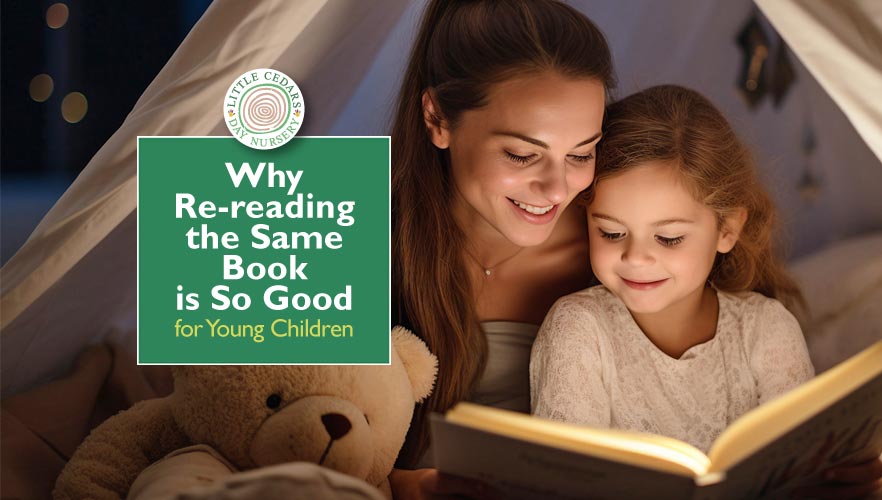
If you’ve ever found yourself reading The Very Hungry Caterpillar or The Gruffalo for the fifteenth time in a week, you’re not alone. Many parents and carers will notice that young children latch onto a particular story and insist on hearing it again and again, often word for word, and with little patience for alternatives. It’s a scenario that plays out in homes and nurseries everywhere — a favourite book that’s already been read countless times, yet you hear another heartfelt plea of “Again!”
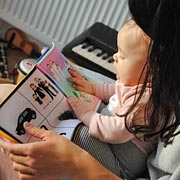 At first glance, this devotion to a single story might seem puzzling. As adults, we crave novelty and variation, and it’s tempting to encourage children to explore new titles or gently steer them towards something ‘different’. But this desire for repetition is not only entirely normal for infants, toddlers and preschoolers — it’s actually a sign of healthy development. In fact, there’s a great deal happening beneath the surface every time your child requests a beloved book for the umpteenth time.
At first glance, this devotion to a single story might seem puzzling. As adults, we crave novelty and variation, and it’s tempting to encourage children to explore new titles or gently steer them towards something ‘different’. But this desire for repetition is not only entirely normal for infants, toddlers and preschoolers — it’s actually a sign of healthy development. In fact, there’s a great deal happening beneath the surface every time your child requests a beloved book for the umpteenth time.
In today’s post, we’ll explore why children are drawn to repeated readings, what they gain from the experience, and how supporting this instinct — both at home and in the nursery setting — can help lay the foundation for a lifelong love of language, stories and learning.
Why Repetition Feels Good to Young Children
For very young children, the world is a busy and often unpredictable place. Every day brings something new to see, hear, taste or try. Although that can be exciting, it can also overwhelm little ones. In contrast to all this change, repetition provides a welcome sense of familiarity and control. When a child chooses to hear the same story again and again, they are engaging with something known and reassuring — something where they already understand the pattern, remember the characters, and can predict what happens next. That sense of mastery is deeply comforting to them.
“Repetition provides a welcome sense of familiarity and control.”
From a developmental perspective, repetition plays an important role in helping children make sense of their surroundings. The human brain in the early years is working at an astonishing pace, constantly building connections and absorbing information. Repeated experiences help strengthen those neural pathways. Hearing the same sentences or phrases in a book over and over helps the brain to recognise patterns, anticipate outcomes, and form more lasting memories.
“Hearing the same sentences or phrases in a book over and over helps the brain to recognise patterns, anticipate outcomes, and begin to form more lasting memories.”
 There is also an emotional component to repeated reading. When a child hears a favourite story in the voice of a parent or trusted adult, it creates a strong sense of connection. The warmth, tone and rhythm of familiar words spoken by someone they love reinforce a feeling of safety and belonging. For many children, this shared experience becomes part of their routine, and returning to a much-loved story can offer comfort in moments of transition, tiredness or uncertainty.
There is also an emotional component to repeated reading. When a child hears a favourite story in the voice of a parent or trusted adult, it creates a strong sense of connection. The warmth, tone and rhythm of familiar words spoken by someone they love reinforce a feeling of safety and belonging. For many children, this shared experience becomes part of their routine, and returning to a much-loved story can offer comfort in moments of transition, tiredness or uncertainty.
Ultimately, repetition isn’t a sign of boredom or a lack of imagination — it’s a powerful tool that children instinctively use to deepen their understanding of language, narrative, and the world around them. While it may test an adult’s patience from time to time, for a young child, there’s real joy in knowing what comes next — and in getting to experience that joy all over again.
“There’s real joy in knowing what comes next — and in getting to experience that joy all over again.”
What Children Are Learning When They Hear the Same Book Over and Over
Although it may seem as though nothing new is happening when a child asks for the same book yet again, each repeated reading is building something important beneath the surface. Young children learn through repetition, and stories are one of the richest and most enjoyable ways to support that process.
 One of the clearest benefits of repeated reading is vocabulary development. Hearing the same words and phrases over time helps children internalise them. This is especially important when books introduce new or more complex language than a child might hear in everyday conversation. By encountering those words again and again in a familiar context, children begin to understand them more deeply and even start to use them in their own speech. The rhythm and rhyme found in many favourite books further support this by making the language more memorable and easier to imitate.
One of the clearest benefits of repeated reading is vocabulary development. Hearing the same words and phrases over time helps children internalise them. This is especially important when books introduce new or more complex language than a child might hear in everyday conversation. By encountering those words again and again in a familiar context, children begin to understand them more deeply and even start to use them in their own speech. The rhythm and rhyme found in many favourite books further support this by making the language more memorable and easier to imitate.
Repetition also supports children’s comprehension skills. Each time a story is heard, a child can focus on different aspects of it. On one occasion, they might be captivated by the pictures; on another, they might notice how a character is feeling, or how the story builds to its conclusion. With each reading, their understanding becomes more layered and nuanced, and their ability to retell or discuss the story improves too. This not only lays the groundwork for future reading comprehension, but also builds important narrative skills that will support them across all areas of communication and learning.
Another key area of development supported by re-reading is, of course, memory. As children hear a story repeatedly, they begin to anticipate what happens next, often joining in with familiar lines or reciting whole sections by heart. This ability to recall and predict is a sign that they are developing strong cognitive skills, including sequencing, attention, and auditory memory. These are all crucial foundations for later literacy.
Stories also offer a window into emotions, relationships, and the wider world. Through characters and plots, children are introduced to a range of feelings and situations, many of which may mirror their own experiences. When a child asks for the same book repeatedly, it may be because the story has resonated with them on a personal level. The more times they hear it, the more opportunities they have to explore those feelings and make sense of them in a safe and supportive way.
In essence, that familiar book on the shelf isn’t just a favourite — it’s a powerful learning tool, offering children the chance to build language, understanding, and confidence each time it’s opened.
“A familiar book is a powerful learning tool, offering children the chance to build language, understanding, and confidence each time it’s opened.”
Supporting This at Home
 At home, parents or carers can support this by continuing to follow a child’s lead. If your child keeps choosing the same book, that’s a good thing — it means they’re connecting with it. You can enhance the experience by reading with enthusiasm, pausing to let your child fill in familiar lines, or asking gentle questions like “What happens next?” or “How do you think they feel here?” If your child wants to tell you the story instead, even better — this kind of role reversal strengthens memory, language, and storytelling abilities.
At home, parents or carers can support this by continuing to follow a child’s lead. If your child keeps choosing the same book, that’s a good thing — it means they’re connecting with it. You can enhance the experience by reading with enthusiasm, pausing to let your child fill in familiar lines, or asking gentle questions like “What happens next?” or “How do you think they feel here?” If your child wants to tell you the story instead, even better — this kind of role reversal strengthens memory, language, and storytelling abilities.
It’s also important to enjoy the shared experience. Reading the same book again isn’t a task to be ticked off — it’s an opportunity to connect, communicate, and learn together. And, by honouring children’s desire for repetition, we’re showing them that their interests matter to us. We’re also showing that we’re there for them to help nurture their developing minds.
Repetition Is a Sign of Growth
It’s easy to assume that when a child insists on reading the same book for the fifth time in a row, they’re simply stuck in a habit. But in truth, this kind of repetition is often a clear sign of growth. Rather than being a sign that they aren’t moving forward, it shows that they are consolidating what they’ve already learned — laying the groundwork for more complex thinking, communication, and understanding.
“Repetition shows that children are consolidating what they’ve already learned — laying the groundwork for more complex thinking, communication, and understanding.”
Children instinctively return to what feels manageable and rewarding. A book they already know offers them a chance to succeed, to feel confident in their understanding, and to enjoy the predictability of a story they can follow with ease. Each time they hear the same words, they’re not just passively listening — they’re actively building familiarity with language patterns, story structures, and emotional cues.
“A book they already know offers them a chance to succeed, to feel confident in their understanding, and to enjoy the predictability of a story they can follow with ease.”
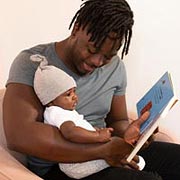 Eventually, children do move on. When they’ve had their fill of a particular book, they’re often ready to explore new stories with a richer set of skills in place. The comfort and confidence gained from repeated readings help them approach unfamiliar books with greater interest and less frustration. So rather than seeing repetition as a rut, it’s helpful to view it as a bridge — a way for children to move steadily from the familiar to the new.
Eventually, children do move on. When they’ve had their fill of a particular book, they’re often ready to explore new stories with a richer set of skills in place. The comfort and confidence gained from repeated readings help them approach unfamiliar books with greater interest and less frustration. So rather than seeing repetition as a rut, it’s helpful to view it as a bridge — a way for children to move steadily from the familiar to the new.
So the next time your child runs up to you with that well-worn favourite, eager to hear it “just one more time,” you’ll know it’s a good thing. Repeated reading is doing far more than meets the eye! It’s helping to build language, memory, emotional understanding and connection — all wrapped up within the safe and familiar story they love.
Little Cedars Nursery

 At our childcare nursery in Streatham, we understand how important repeated reading is for young children’s development, embracing it as a valuable part of our daily routine. Story time is a cherished activity, and we know that when a child asks for a favourite book again, it’s because they’re engaging deeply with it. Whether it’s the comforting rhythm of a well-loved picture book or the excitement of anticipating a favourite character’s next adventure, we follow the children’s interests and support their choices — however many times they may request them. After all, we know that every repeated story is a step forward in a child’s learning journey.
At our childcare nursery in Streatham, we understand how important repeated reading is for young children’s development, embracing it as a valuable part of our daily routine. Story time is a cherished activity, and we know that when a child asks for a favourite book again, it’s because they’re engaging deeply with it. Whether it’s the comforting rhythm of a well-loved picture book or the excitement of anticipating a favourite character’s next adventure, we follow the children’s interests and support their choices — however many times they may request them. After all, we know that every repeated story is a step forward in a child’s learning journey.
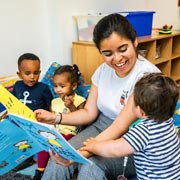 Our practitioners are skilled at making repeated reading feel fresh and interactive, even when the story is already very familiar. By using expressive voices, gestures, and encouraging children to join in with key words or sounds, we help bring the story to life each time. Children are often invited to take on the role of storyteller themselves, turning pages, pointing to pictures, and even “reading” aloud from memory. These small but powerful moments help build confidence and strengthen communication skills in a way that feels natural and joyful.
Our practitioners are skilled at making repeated reading feel fresh and interactive, even when the story is already very familiar. By using expressive voices, gestures, and encouraging children to join in with key words or sounds, we help bring the story to life each time. Children are often invited to take on the role of storyteller themselves, turning pages, pointing to pictures, and even “reading” aloud from memory. These small but powerful moments help build confidence and strengthen communication skills in a way that feels natural and joyful.
At Little Cedars Nursery, we also make space for quiet, independent reading. Our book areas are set up with inviting, accessible book choices so that children can freely revisit the stories they love. It’s not uncommon to see a toddler carefully turning the pages of a book they know well, reciting parts of it to themselves or sharing it with a friend! These self-initiated moments show just how much children internalise and treasure the books that matter to them.
Why not explore the possibility of sending your baby, toddler, or preschooler to Little Cedars Nursery in Streatham? We’re rated as a Good Provider by Ofsted and support many Government-funded childcare schemes and vouchers. These include the ’30 Hours’ extension to free childcare for children aged from just 9 months (for eligible working families) that begins in September 2025. Contact us today!
Little Cedars Nursery provides a first-class childcare service to families in Streatham and may also be convenient for families in and around Tooting, Furzedown, Balham, Norbury and Colliers Wood.

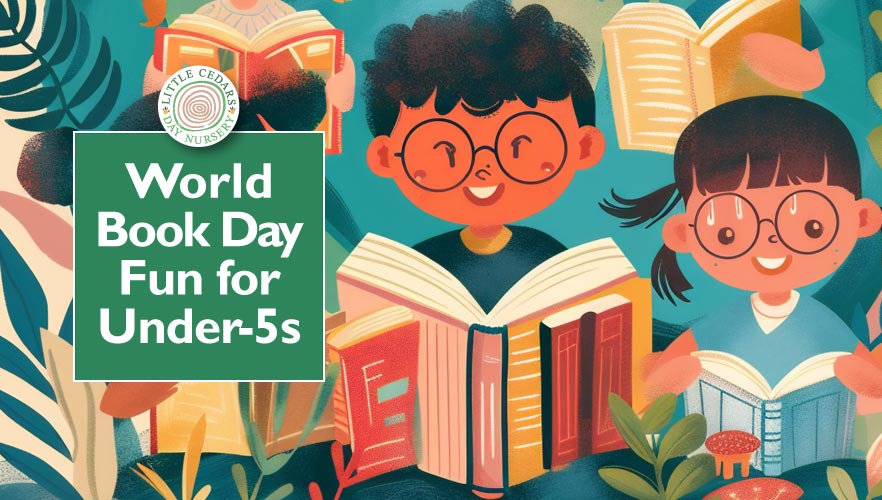
 Children of the UK, it’s time to get ready for World Book Day! Arriving in early March, it is a wonderful annual event where children across the nation get to immerse themselves in books, storytelling, and other book-inspired activities. Such activities are incredibly important for children. Did you know, for example, that children who regularly read for pleasure are happier children who also go on to have greater success in their lives? This uplift is even more significant for children from disadvantaged backgrounds. Such is the power of reading for little ones! With all this in mind, today’s article outlines more about World Book Day and why it’s so important. It also suggests some activities that children and families can take part in to celebrate this year’s event.
Children of the UK, it’s time to get ready for World Book Day! Arriving in early March, it is a wonderful annual event where children across the nation get to immerse themselves in books, storytelling, and other book-inspired activities. Such activities are incredibly important for children. Did you know, for example, that children who regularly read for pleasure are happier children who also go on to have greater success in their lives? This uplift is even more significant for children from disadvantaged backgrounds. Such is the power of reading for little ones! With all this in mind, today’s article outlines more about World Book Day and why it’s so important. It also suggests some activities that children and families can take part in to celebrate this year’s event. World Book Day arrives each year on the first Thursday of March. So, for 2025 it’s celebrated on the 6th of March, then in 2026 it’s on the 5th, for 2027 it’s the 4th, and so on. Organised by the charity of the same name, the core mission of World Book Day is “to promote reading for pleasure, offering every child and young person the opportunity to have a book of their own.” The reason is simple: a life-long love of reading for pleasure results in improved life chances. It’s incredibly powerful for children of all ages, as indicated in the following findings from the Organisation for Economic Co-operation & Development:
World Book Day arrives each year on the first Thursday of March. So, for 2025 it’s celebrated on the 6th of March, then in 2026 it’s on the 5th, for 2027 it’s the 4th, and so on. Organised by the charity of the same name, the core mission of World Book Day is “to promote reading for pleasure, offering every child and young person the opportunity to have a book of their own.” The reason is simple: a life-long love of reading for pleasure results in improved life chances. It’s incredibly powerful for children of all ages, as indicated in the following findings from the Organisation for Economic Co-operation & Development: The World Book Day® charity published a 17-page impact report for the event that took place in 2024. One of the key findings was that something needed to be done to stop the significant drop in children reading for pleasure. Otherwise, children would be missing out on some profound benefits. The report concluded that there had been several reasons for the downward trend. For example, 20% of children said they felt judged for what books they read. Some said that reading felt more like a chore or ‘work’ because the books were foisted upon them by adults. Just over 8% of children simply didn’t have access to any books at home. Of those that did, over a third said they had no choice over what they read.
The World Book Day® charity published a 17-page impact report for the event that took place in 2024. One of the key findings was that something needed to be done to stop the significant drop in children reading for pleasure. Otherwise, children would be missing out on some profound benefits. The report concluded that there had been several reasons for the downward trend. For example, 20% of children said they felt judged for what books they read. Some said that reading felt more like a chore or ‘work’ because the books were foisted upon them by adults. Just over 8% of children simply didn’t have access to any books at home. Of those that did, over a third said they had no choice over what they read. In the UK, children under 18 are eligible to receive a £1 book token through the event. This can be used to buy a special World Book Day title or go towards another book (
In the UK, children under 18 are eligible to receive a £1 book token through the event. This can be used to buy a special World Book Day title or go towards another book (
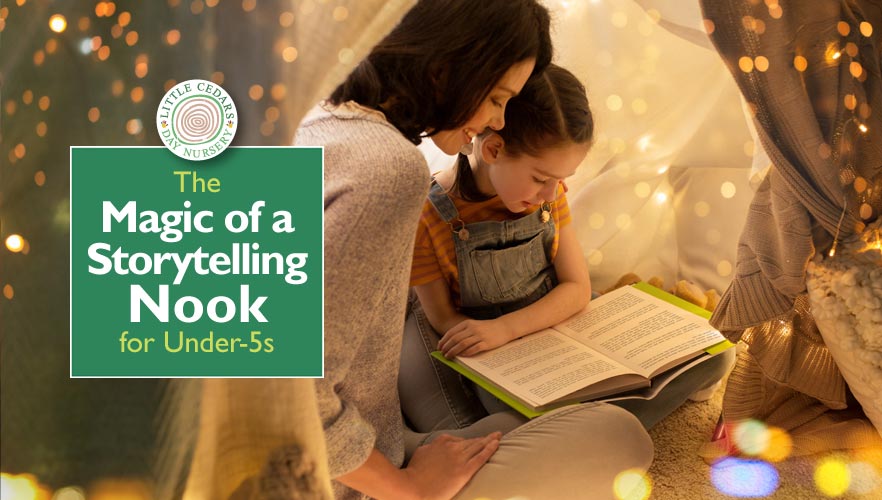
 Any successful storytelling nook needs to be warm, cosy, quiet and comfortable. That means choosing a corner or recess of some kind in the home that’s away from distractions like TVs and game consoles. Somewhere that’s not used as a thoroughfare by other family members will also help. Wherever you choose, it also needs to be warm. Therefore, somewhere away from draughts is required, so avoid being too close to entrances and exits to the outside. A corner of a quiet room or a tranquil alcove are therefore often ideal spots for your child’s storytelling nook.
Any successful storytelling nook needs to be warm, cosy, quiet and comfortable. That means choosing a corner or recess of some kind in the home that’s away from distractions like TVs and game consoles. Somewhere that’s not used as a thoroughfare by other family members will also help. Wherever you choose, it also needs to be warm. Therefore, somewhere away from draughts is required, so avoid being too close to entrances and exits to the outside. A corner of a quiet room or a tranquil alcove are therefore often ideal spots for your child’s storytelling nook. Whether reading from a book or creating a new story off the top of one’s head, there’s something that really brings a story to life — being animated and expressive during storytelling, rather like actors might do. That’s true whether it’s the adult or the child telling the story.
Whether reading from a book or creating a new story off the top of one’s head, there’s something that really brings a story to life — being animated and expressive during storytelling, rather like actors might do. That’s true whether it’s the adult or the child telling the story. Do consider adding a storytelling nook or reading corner to your child’s home. They’re great vehicles for escapism, are incredibly worthwhile, and offer potentially magical experiences for your child. And, if you go the extra mile to make them cosy, immersive and special, they will encourage your child to love reading and creating new adventures using their imagination. Storytelling nooks and reading corners can open up whole new worlds to your child and be a wonderful antidote to electronic screens, gloomy weather, and more limited daylight during winter months. What’s more, they’re a great way for all parties to grow deeper bonds through shared periods of exquisitely immersive, high-quality time.
Do consider adding a storytelling nook or reading corner to your child’s home. They’re great vehicles for escapism, are incredibly worthwhile, and offer potentially magical experiences for your child. And, if you go the extra mile to make them cosy, immersive and special, they will encourage your child to love reading and creating new adventures using their imagination. Storytelling nooks and reading corners can open up whole new worlds to your child and be a wonderful antidote to electronic screens, gloomy weather, and more limited daylight during winter months. What’s more, they’re a great way for all parties to grow deeper bonds through shared periods of exquisitely immersive, high-quality time.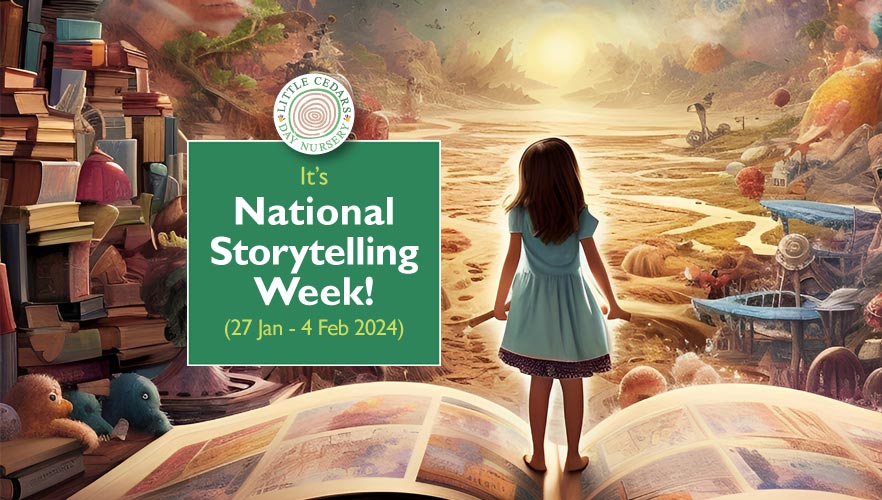
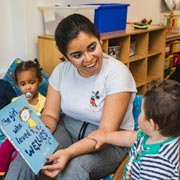 Children and families, get ready for National Storytelling Week! For 2024, storytelling in the UK is officially celebrated from Saturday the 27th of January to Sunday the 4th of February. It’s a great opportunity for children and families to get creative and to entertain one another through the sharing of stories.
Children and families, get ready for National Storytelling Week! For 2024, storytelling in the UK is officially celebrated from Saturday the 27th of January to Sunday the 4th of February. It’s a great opportunity for children and families to get creative and to entertain one another through the sharing of stories. National Storytelling Week couldn’t come at a better time of year. As many across the UK have witnessed in recent weeks, January brings with it cold days, dull skies, and wintery weather. Even the daylight hours are short, limiting the number of activities children can undertake outdoors. With storytelling, however, families can be transported to any number of different locations, situations and climates, all in the blink of an eye. Indeed, storytelling can take children to places and scenarios that would simply not be possible in real life. Such is the power of this art form and the human imagination.
National Storytelling Week couldn’t come at a better time of year. As many across the UK have witnessed in recent weeks, January brings with it cold days, dull skies, and wintery weather. Even the daylight hours are short, limiting the number of activities children can undertake outdoors. With storytelling, however, families can be transported to any number of different locations, situations and climates, all in the blink of an eye. Indeed, storytelling can take children to places and scenarios that would simply not be possible in real life. Such is the power of this art form and the human imagination. Stories stimulate imaginations;
Stories stimulate imaginations; Another great way to help children create new stories is to encourage them to be inspired by objects around them. For example, a teddy bear, toy character, or picture nearby may inspire them. This can be taken further by providing children with a basket of such props, for example, a toy animal, pine cone, toy crown, goblet, apple, and a rock. A ‘story scrapbook’ can be used by children in a similar way. Such things can significantly help children to become more creative and generate storyline ideas, sequencing, and plot twists.
Another great way to help children create new stories is to encourage them to be inspired by objects around them. For example, a teddy bear, toy character, or picture nearby may inspire them. This can be taken further by providing children with a basket of such props, for example, a toy animal, pine cone, toy crown, goblet, apple, and a rock. A ‘story scrapbook’ can be used by children in a similar way. Such things can significantly help children to become more creative and generate storyline ideas, sequencing, and plot twists.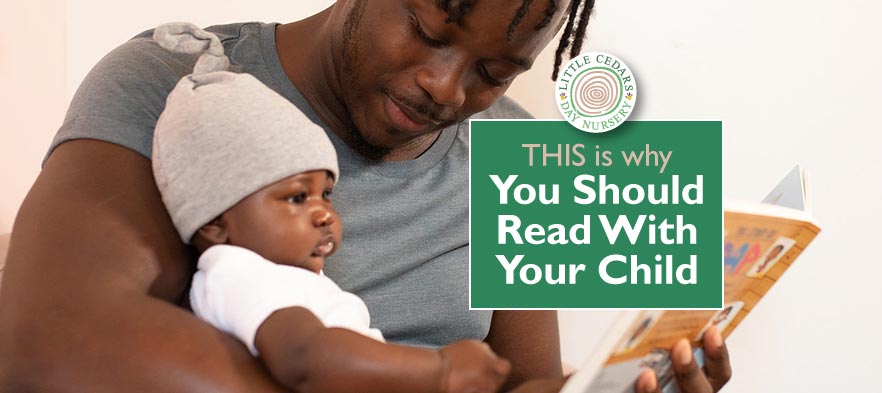
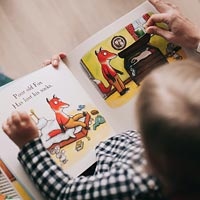 In April last year, we published a compelling article about
In April last year, we published a compelling article about  Reading with children also makes the task less daunting, particularly for the youngest children. Reading together also makes it more interesting and more fun. When it’s more interesting and more fun, the child is going to enjoy it more and naturally want to read more often — eventually independently — and all of that is priceless as part of their education and general knowledge going forwards. Reading can also bring parent and child closer through the time spent together. It can be great fun for the adult too, particularly when the child gets older and adults are exposed to classic children’s books that perhaps they were not, themselves, exposed to when they were young.
Reading with children also makes the task less daunting, particularly for the youngest children. Reading together also makes it more interesting and more fun. When it’s more interesting and more fun, the child is going to enjoy it more and naturally want to read more often — eventually independently — and all of that is priceless as part of their education and general knowledge going forwards. Reading can also bring parent and child closer through the time spent together. It can be great fun for the adult too, particularly when the child gets older and adults are exposed to classic children’s books that perhaps they were not, themselves, exposed to when they were young. The Nuffield Foundation’s mission is to advance social wellbeing and educational opportunity. In a partnership with the University of Newcastle, the foundation funded a deep study
The Nuffield Foundation’s mission is to advance social wellbeing and educational opportunity. In a partnership with the University of Newcastle, the foundation funded a deep study It will come as no surprise, therefore, to learn that we put all of the above into practice at Little Cedars Nursery in Streatham. Getting closely involved in children’s reading, using a huge variety of reading material in an interactive way, gives our nursery children the very best start in life. Indeed, our childcare professionals prepare them thoroughly for school by the time they leave us. They take with them reading, writing, literacy, language, vocabulary and self-expression skills in the process — and all this accomplished at least in part through guided reading.
It will come as no surprise, therefore, to learn that we put all of the above into practice at Little Cedars Nursery in Streatham. Getting closely involved in children’s reading, using a huge variety of reading material in an interactive way, gives our nursery children the very best start in life. Indeed, our childcare professionals prepare them thoroughly for school by the time they leave us. They take with them reading, writing, literacy, language, vocabulary and self-expression skills in the process — and all this accomplished at least in part through guided reading.